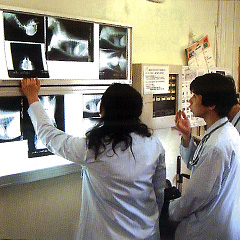| Basic Veterinary Medicine |
| Theriogenology |
- Neuroendocrine mechanism regulating ovulation and follicular development in female mammals
- Pathophysiological mechanism mediating suppressed gonadal activities under malnutrition
- Remodeling on mechanisms associated with pregnancy establishment
- Changes in placental structures through mammalian evolution
- Development of systems effective in improving reproductive efficiency
|
| Veterinary Anatomy |
- Molecular and cellular analyses of mammalian gonadogenesis, testiculogenesis and spermatogenesis
- Roles of SOX (SRY-related HMG box) genes in mammalian embryogenesis and organogenesis
|
| Veterinary Physiology |
- Regulation of reproductive function by the neuron-endocrine-immune system
- Molecular mechanisms underlying sexual differentiation of the brain
- Neuroendocrine control of body growth and metabolism
- Regulatory mechanisms involved in growth and regeneration of skeletal muscle
|
| Veterinary Pharmacology |
- Signal transduction in the cells and its modification by drugs
- Pharmacological effects of bioactive natural products
|
| Veterinary Microbiology |
- Studies on the mechanisms of persistent infection and reactivation of animal viruses and protozoas
- Development of recombinant vaccines for animals
|
| Veterinary Public Health |
- Control of zoonotic bacterial and viral pathogens in humans, livestock and foods
- Ecology and role of bacteria harboring in the intestine of human and animal
|
| Veterinary Ethology *1 |
- Chemical communication via pheromones in mammalian species
- Nature or nurture questions for the personality formation
- Clinical studies in veterinary behavior medicine
|
| Cellular Biochemistry *1 |
- Studies on the molecular mechanisms underlying growth and differentiation of cell lineages
- Elucidation of the role of genomic DNA methylation in the epigenetic control of cellular differentiation development
- Investigation of molecular mechanism for the maintenance of totipotency and pluripotency in the stem cells, including ES, TS and EG cells
- Risk assessment of endocrine chemical disruptors for mammalian development
|
| Molecular Immunology *1 |
- Immunopathological understanding of host-parasite relationship during protozoan diseases
- Development of drugs, vaccines and diagnostics for parasitic diseases
- Ecology and biology of sandflies as the vector for Leishmania
|
| Applied Genetics *1 |
- Studies on pathophysiological effects of low-radiation studies on lipid-signaling in inflammation (tumor, allergy, tissue regeneration)
|
| Animal Radiology *1 |
- Studies on pathophysiological effects of low radiation
- Studies on lipid signaling in inflammation (tumors, allergies, and tissue regeneration)
|
| Clinical Veterinary Medicine |
| Veterinary Pathophysiology and Animal Health |
- Pathophysiology of circulation, respiration and autonomic nervous system
|
| Veterinary Pathology |
- Comparative neuropathology
- Comparative oncology
- Experimental and toxicologic pathology
|
| Veterinary Internal Medicine |
- Molecular diagnostics of lymphoid and hematopoietic malignancies
- Pathogenesis of inflammatory gastrointestinal (GI) and Liver diseases
- Clinical application of acute phase proteins (APPs)
|
| Veterinary Surgery |
- Biological and translational research of tumors in small animals
- Regenerative therapy in veterinary medicine
- Anesthetic/analgesic and perioperative management in small animals
|
| Biomedical Science |
- Studies on viral infectious diseases in experimental animals
- Establishment and analysis of animal model of diseases
|
| Veterinary Clinical Pathobiology |
- Diagnosis and pathophysiology of central nervous system disorders
- Diagnostic and therapeutic studies on Diabetes
- Molecular basis of genetic disorders
|
| Infection Control and Disease Prevention |
- Studies on pathogenesis of slow infection including viral cancer
- Studies on pathogen detection methods
- Studies on vaccine for controlling infectious diseases
|
| Veterinary Emergency Medicine |
- Regeneration of bone tissues using artificial bone implants
- Development of new treatment for osteoporosis
- Biological effects of trehalose
|
| Global Animal Resource Science *2 |
- Veterinary epidemiology, import risk assessment of animals and animal products, food safety risk assessment
- Vaccinology including mucosal delivary system, edible vaccines, immunogen formulation, and host immunity
|
| Bio-Animal Science *3 |
| Animal Life Science and Biotechnology |
- Safety and risk assessment of animal-derived foods including evaluation of radioactive contamination of livestock and livestock products due to the Fukushima Daiichi nuclear power plant accident
- Studies on regulation of microbial infection by sterilization of compost using ultra high temperature aerobic bacterial fermentation
- Studies on physiological characteristics of the ovary including research of molecular mechanism of oocyte selection in mammalian ovaries
- Studies on nutritional effect of amino acids on infantile growth in farm animals
|
| Food Safety and Science *4 |
| Laboratory of Food-born Pathogenic Microbiology |
- Genome-wide screening for the virulence markers of Streptococcus suis
- Surveillance of the Streptococcus suis virulent strains among healthy pigs and retail pork meat in Japan
- Functional analysis of genetic regions associated with fimbriation in Streptococcus suis
- Studies on the virulence mechanisms of Streptococcus gallolyticus of avian origin
- Development of a rapid detection system for bacterial pathogens associated with food poisoning
|
| Experimental Medicine *5 |
| Laboratory Animal Research Center |
- Analysis of pathogenicity and species specificity of RNA viruses
- Analysis of mechanisms of RNA virus persistent infection
- Development of novel treatments for emerging lethal virus infections
- Development of new recombinant vaccines
- Development of recombinant viruses as oncolytic virotherapy agents
|


